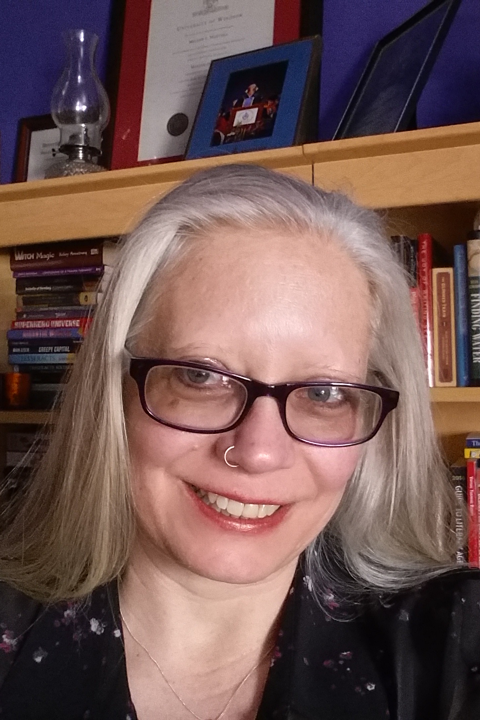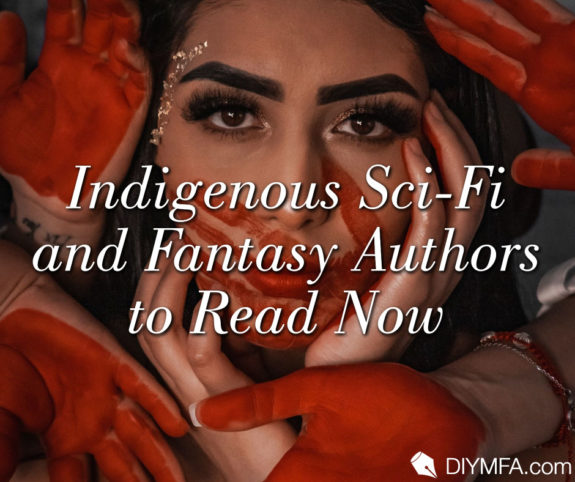I know Indigenous Peoples’ Day was back on October 12th. Heck, Canada’s National Indigenous Peoples Day was way back on June 21st, but I wanted to share some of my favourite Indigenous Science Fiction and Fantasy authors with you in the interest of diversifying your reading.
Black Sun by Rebecca Roanhorse
I first encountered Roanhorse’s work through the first book in the Sixth World series, Trail of Lightning. Her 2018 release went on to win a Locus Award. Both Trail of Lightning and Storm of Locusts, the second book, are set in Dinétah, after floods, fire, and famine transform the rest of the world. A side effect of this climate catastrophe is that the gods and monsters of ancient story walk among humans. Fortunately, Maggie Hoskie, also known as War Child, makes her living hunting monsters.
Black Sun is Roanhorse’s most recent publication, set in a fantasy world based on the civilizations of the Pre-Columbian Americas. The protagonist Xiala, a disgraced Teek whose song can calm the waters around her as easily as it can warp a man’s mind, arrives in the city of Tova on the day of an eclipse, an event said to unbalance the world.
Bonus: On her recent My Favorite Bit feature on Mary Robinette Kowal’s blog, Roanhorse shares some of her playlist for Black Sun.
Rebecca Roanhorse is of Ohkay Owingeh (Pueblo) and African American heritage, and her husband and daughter are Diné.
Moon of the Crusted Snow by Waubgeshig Rice
Waubgeshig Rice was host of northeastern Ontario’s CBC afternoon radio show, Up North at the time Moon of the Crusted Snow was published. I attended a reading and bought the book on the spot.
Moon of the Crusted Snow is a post-apocalyptic novel set in a small northern Anishinaabe community. Rumors of trouble in larger cities to the south precede an early winter. First, the power goes out, then the phones and the internet, leaving the community completely isolated. As they struggle to survive, strangers begin to arrive, disrupting the community’s precarious balance.
Waubgeshig Rice is an Anishinaabe writer, journalist, and radio host from the Wasauksing First Nation.
Son of a Trickster by Eden Robinson
I started reading Eden Robinson on Waubgeshig Rice’s recommendation.
Son of a Trickster is the first book in the aptly named Trickster trilogy. It tells the take of Jared, a teen who sells weed cookies and tries to take care of his family. Weird thing is that crows talk to him and he keeps losing time. When a young woman with eclectic taste and a penchant for protest moves into the neighbourhood, Jared is attracted to her, but not because of the way she looks. Whenever he sees her, she has lights like fireflies dancing around her …
I loved Son of a Trickster and the follow up, Trickster Drift. The third novel, Return of the Trickster, is coming out in the spring. Bonus: If you’re like me and can’t wait for more Robinson, you may want to watch CBC’s adaptation, Trickster. The first season started October 6th, and you can catch it on CBC’s streaming service Gem.
Bonus bonus: While you’re there, click through to CBC Listen, where they’ve put together a Trickster playlist including A Tribe Called Red, Snotty Nosed Rez Kids, Tanya Tagaq, Iskwé, and more.
Eden Robinson is a member of the Haisla and Heiltsuk First Nations.
Empire of Wild by Cherie Dimaline
Unsurprisingly, Cherie Dimaline was another recommendation from Waubgeshig Rice.
In Empire of Wild, Dimaline uses the Métis legend of the Rogarou to tell the story of married couple Joan and Victor. Victor has been missing for over a year. Just when Joan thinks she’s never going to see him again, she runs into him—or at least something that looks like him.
If you like Empire of Wild, you may want to check out The Marrow Thieves, in which global warming has resulted in the inability of almost everyone to dream. Indigenous people are immune, however, and now they’re being hunted by Recruiters, who harvest their bone marrow for its dream-giving properties.
Cherie Dimaline is a Métis writer from the Georgian Bay Métis Nation.
Future Home of the Living God by Louise Erdrich
Future Home of the Living God is a dystopian novel set in a future world in which the babies being born seem to be devolving. Cedar Hawk Songmaker is four months pregnant, and she decides to try to find her biological mother. Along the way, the US crumbles under the threats of martial law and Christian dogma. Erdich’s other novels aren’t SFnal, so this may be an entry into her more literary work.
Louise Erdrich is Anishinaabe and an enrolled member of the Turtle Mountain Band of Chippewa Indians.
Just the Beginning of the Journey
There are so many excellent books across genres and age categories being produced by Indigenous people worldwide. While this trend has received a bump in recent years, Indigenous literature has a long and award-winning history. You owe it to yourselves to open the pages of books by these amazing storytellers.
Here are just a couple of places to start your journey:
- https://bookriot.com/sff-books-by-indigenous-authors/
- https://theportalist.com/indigenous-authors-sci-fi-fantasy
Until next time, keep speculating and see where it leads you!

Melanie Marttila creates worlds from whole cloth. She’s a dreamsinger, an ink alchemist, and an unabashed learning mutt. Her speculative short fiction has appeared in Bastion Science Fiction Magazine, On Spec Magazine, and Sudbury Ink and her speculative poetry has appeared in Polar Borealis and Stellar Evolutions. She lives and writes in Sudbury, Ontario, Canada, where she spends her days working as a corporate trainer. She blogs at https://www.melaniemarttila.ca and you can find her on Facebook and Twitter.







